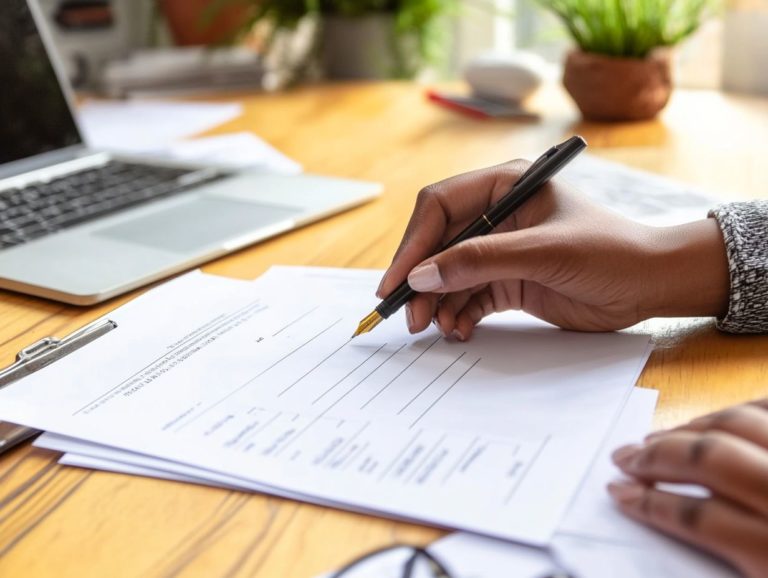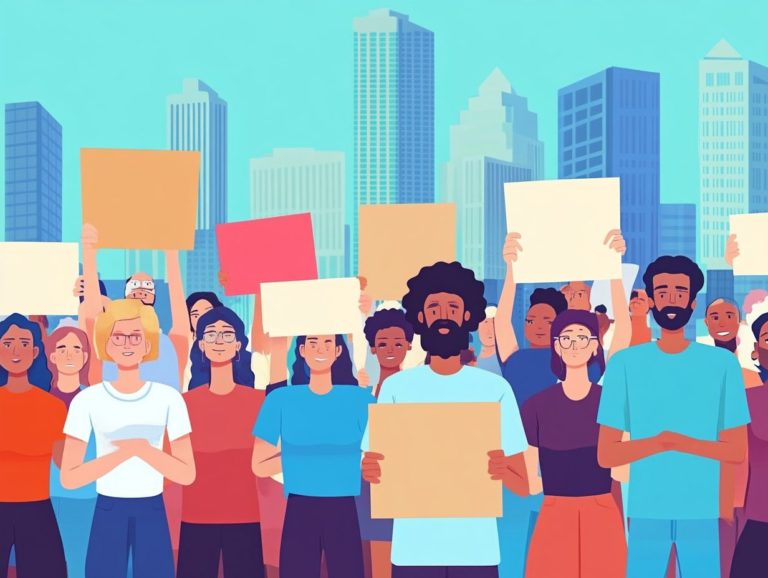Your Rights in Pre-Trial Procedures
Navigating the legal landscape can feel overwhelming, particularly when it comes to pre-trial procedures. This critical phase lays the groundwork for everything that follows in a court case. Understanding your rights such as the right to legal representation and due process can empower you during this challenging time.
From plea bargaining to the discovery process, it s essential to know what to expect and how to safeguard your interests. This guide will guide you through the pre-trial process, ensuring you re fully prepared for what lies ahead.
Contents
- Key Takeaways:
- Understanding Pre-Trial Procedures
- Your Rights During Pre-Trial Procedures
- Common Pre-Trial Procedures
- How to Protect Your Rights During Pre-Trial Procedures
- Frequently Asked Questions
- What are my rights in pre-trial procedures?
- Can I waive my rights in pre-trial procedures?
- Can the police search my property during pre-trial procedures?
- Am I entitled to a public defender during pre-trial procedures?
- What Happens During a Pre-Trial Hearing?
- What If My Rights Are Violated During Pre-Trial Procedures?
Key Takeaways:

You have the right to legal representation during pre-trial procedures, so make sure to work with a qualified lawyer to protect your interests.
The right to a fair and impartial trial is a fundamental right, and it applies during pre-trial procedures as well. Make sure your rights are respected and upheld throughout the process.
Understanding court procedures and being prepared for common pre-trial procedures, such as plea bargaining and discovery, can help you protect your rights and achieve a favorable outcome in your case.
Understanding Pre-Trial Procedures
Understanding pre-trial procedures is essential for you as an accused individual. It lays the groundwork for your legal journey within the criminal justice system.
These procedures include important steps that occur before your trial, such as arrest, arraignment, and the decision on whether you will be detained or released on bond.
Being well-versed in these processes not only provides you with vital insights for effective navigation but also protects your constitutional rights, especially the right to a fair trial and the presumption of innocence.
By actively engaging with these procedures, you can assert your rights more effectively and prepare for the intricacies of the judicial process.
What are Pre-Trial Procedures?
Pre-trial procedures include important steps that unfold after your arrest and before your trial begins within the criminal legal system. These procedures are important for deciding the outcome of your case, often guiding the legal strategies employed by both the defense and prosecution.
You will first attend an initial hearing where a judge reviews the evidence to determine if there’s enough cause to move forward. Following this, the arraignment occurs, where you formally state your plea whether guilty, not guilty, or no contest.
Throughout this process, pretrial motions can be filed by either party to address various concerns, such as the admissibility of evidence or requests for dismissals. Each of these stages carries significant implications for you, influencing not only your legal fate but also your emotional and psychological well-being as you navigate the complexities of the judicial system.
Your Rights During Pre-Trial Procedures
Navigating the realm of pre-trial procedures is crucial for grasping your rights, particularly the right to a fair trial and due process.
Understanding these rights is vital they are your shield in the legal arena! These rights are the cornerstone of any criminal legal system, and understanding them gives you the power to face legal challenges.
Right to Legal Representation
The right to legal representation is a cornerstone of ensuring you can adequately defend yourself within the criminal legal system. This right guarantees that everyone, regardless of financial means, has access to a qualified attorney who can expertly navigate the complexities of the law.
Public defenders play an essential role in this process, stepping in to represent those who can’t afford private counsel, ensuring that you never have to face legal challenges alone. To secure legal counsel, you can reach out to local legal aid organizations or consult court resources designed to help you find representation.
Ultimately, this right is critical in upholding the principles of a fair trial and due process, giving you the power to present your case effectively and defend your freedoms.
Right to a Fair and Impartial Trial

The right to a fair and impartial trial stands as a cornerstone of any judicial system. It ensures that you, as an accused individual, receive equitable treatment throughout the legal process. This fundamental principle not only protects your interests but also upholds public confidence in the legal system as a whole.
The necessity for unbiased juries and judges cannot be overstated. When these individuals allow their own prejudices to infiltrate the courtroom, the integrity of your trial can be severely compromised.
Discrimination and bias can skew trial outcomes, leading to unjust verdicts that may devastate lives and erode faith in justice.
To combat such disparities, various mechanisms, including jury selection processes and judicial oversight, are put in place to uphold the sanctity of this right. This ensures that you experience a fair trial, along with everyone else involved.
Right to Due Process
Due process is a fundamental legal principle that ensures you receive fair treatment within the judicial system. It guarantees that all procedures are meticulously followed during criminal proceedings.
At its essence, due process includes important parts such as being informed of the charges against you and having the opportunity to present your case both crucial for anyone facing legal action. You deserve to know what you re up against! This ensures you re not left in the dark during legal proceedings.
For instance, in pre-trial scenarios, you are entitled to formal notification regarding the specific allegations leveled against you. This enables you to prepare a robust defense.
You also have the right to present evidence and testimony during hearings, such as bail hearings or preliminary examinations. This aspect is essential. It not only preserves the integrity of the legal process but also safeguards your individual rights, ensuring that decisions are grounded in a fair evaluation of the case rather than arbitrary judgments.
Common Pre-Trial Procedures
Common pre-trial procedures are essential in shaping the course of criminal proceedings. They offer mechanisms for resolution and lay the foundational groundwork for the trial ahead.
Plea Bargaining
Plea bargaining is key in the pre-trial phase, allowing you to negotiate reduced charges or sentences in return for a guilty plea. This process not only lightens the court’s caseload but also affords you the chance to sidestep the uncertainty of a trial, which can often be drawn out and financially burdensome.
For example, if you were facing serious charges like theft, you might find it advantageous to plead guilty to a lesser offense. This recognition of the challenges of going to trial can lead to potentially receiving a lighter sentence.
While this practice can expedite resolutions and conserve judicial resources, it raises important concerns. Critics contend that this dynamic can pressure innocent individuals into accepting plea deals, ultimately jeopardizing the integrity of the justice system itself.
Discovery Process
The discovery process is a crucial phase in criminal proceedings where you, as a participant, engage in the exchange of evidence and information relevant to your case. This stage is fundamental in safeguarding your rights as an accused individual, ensuring you have access to all pertinent materials before the trial kicks off.
It allows you to scrutinize the evidence collected by law enforcement, including witness statements, forensic reports, and other essential documents. By fostering transparency, the discovery process levels the playing field, giving you the power to craft a defense strategy grounded in a comprehensive understanding of the prosecution’s case.
Ultimately, this process bolsters the foundation of a fair trial, enabling both sides to present their arguments effectively and contribute to a just resolution.
Stay informed and empowered your rights matter!
Motions and Hearings

Motions and hearings are essential components of pre-trial procedures. They act as formal requests to the court for specific rulings related to your case.
These motions can take many forms. For example, suppression motions are designed to exclude inadmissible evidence, while discovery motions compel the opposing party to produce crucial documents.
There are also motions to dismiss, which challenge the case’s merit outright. Each type of motion plays a unique role and can significantly shape the trial’s trajectory. They influence what evidence is presented or even determine whether the case moves forward.
The hearings that follow allow both parties to present their arguments. The judge’s rulings have a profound impact on the judicial process. Successful motions can lead to reduced charges or even dismissal, underscoring their pivotal role in the quest for justice.
How to Protect Your Rights During Pre-Trial Procedures
You must protect your rights during pre-trial procedures to navigate the intricacies of the criminal legal system effectively.
This journey starts with a solid grasp of court procedures and maintaining a close partnership with your lawyer.
Working with Your Lawyer
Working effectively with your lawyer is crucial to ensuring that your rights, including due process, are upheld during the pre-trial phase. In this critical stage, legal counsel whether private attorneys or public defenders plays a critical role in representing you and navigating the intricacies of the judicial system.
They investigate the circumstances surrounding your case, gather evidence, and craft a defense strategy that prioritizes your best interests. Effective communication with your attorney is vital for a collaborative relationship that can significantly influence the outcome.
By regularly sharing updates and concerns, you empower your attorney to advocate for your rights with greater passion and expertise throughout the legal proceedings.
Understanding Court Procedures
You must understand court procedures to protect your rights effectively during pre-trial stages.
Familiarity with these processes can significantly influence the outcome of your legal matters. You have the right to a fair hearing, adequate representation, and the opportunity to challenge evidence.
For example, knowing how to file a motion to suppress evidence can safeguard you against unjust trial outcomes. This ensures that only legally obtained information is taken into account.
Your pre-trial rights, such as the right to bail and the presumption of innocence, highlight the critical nature of these procedures.
By grasping these rights, you can prepare your defense more effectively, potentially swaying decisions that could lead to a favorable settlement or reduced charges.
Frequently Asked Questions
What are my rights in pre-trial procedures?

As a defendant in a criminal case, you have the right to due process and a fair trial. This includes various rights in pre-trial procedures:
- The right to remain silent
- The right to an attorney
- The right to a speedy trial
- The right to confront witnesses against you
Can I waive my rights in pre-trial procedures?
Yes, you have the right to waive your rights in pre-trial procedures, but it is highly recommended to consult with an attorney before doing so. Waiving your rights may have significant consequences for the outcome of your case.
Can the police search my property during pre-trial procedures?
In most cases, the police must obtain a search warrant before searching your property during pre-trial procedures. However, some exceptions exist, such as if they have probable cause to believe that evidence of a crime is present on your property.
Am I entitled to a public defender during pre-trial procedures?
If you cannot afford an attorney, you have the right to a court-appointed attorney, also known as a public defender, to represent you during pre-trial procedures and throughout the trial. However, you may be required to provide proof of your financial situation.
If you’re unsure about your rights, reach out to your lawyer today!
What Happens During a Pre-Trial Hearing?
A pre-trial hearing is where the prosecutor and defense attorney meet with the judge. They discuss the case and may file requests to keep certain evidence out or to throw out the case.
The judge can also set a trial date during this hearing.
What If My Rights Are Violated During Pre-Trial Procedures?
If your rights are violated, your attorney can file a motion to keep evidence out or to dismiss the case. The judge will review and decide if your rights were violated, and whether any evidence should be excluded or if the case should be dismissed.






